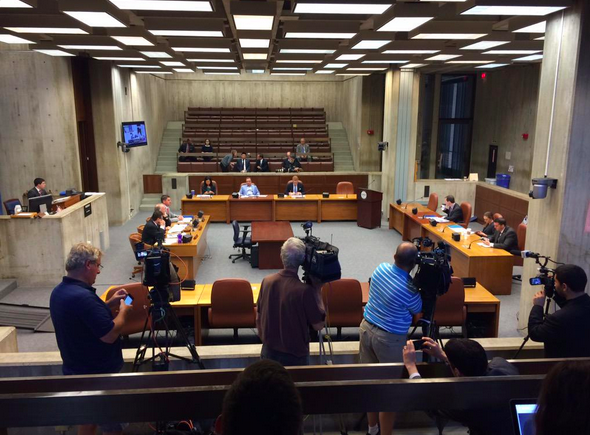June 26, 2015

City Council chamber just before the start of Friday's hearing on the Olympic Games venues and financing. Photo by Lauren Dezenski
The latest hearing on Boston’s bid to host the Olympic Games brought fewer fireworks and was shorter than the two prior, primarily because key pillars of Boston 2024’s proposal to host the Games were not ready to be publicly vetted yet.
"We're in the final throes of completing our financing plan, literally as we speak," Boston 2024 CEO Rich Davey, told the City Council’s Special Committee on the Olympics this morning. Those bid 2.0 details will be available on Monday morning, when Boston 2024 holds a press conference at 10 a.m. at the Boston Convention and Exhibition Center.
While Boston 2024 was not ready to delve into details about the Athletes Village, financing, or the stadium at Widett Circle, Davey had more insight on the so-called “master developer” plan, which the Reporter first reported would bring a private developer in to purchase key parcels of land and develop them to Olympic specifications for the Games.
Davey assured the Council that under the master developer plan, a "transparent and competitive process" as contractors & developers compete for a right to build at Widett Circle. The developer would bear the financial burden–or windfalls–for the parcels that would be used for the Games, specifically at Widett Circle.
“Given the amount of public land involved, it’s probably a process that is spearheaded by the city or the BRA. Obviously we don’t control the zoning, that’s up to the city of Boston and the BRA as well,” Davey said to the press after the meeting, adding that the planning in that area would likely resemble recent efforts in the Seaport District or the Prudential Center area in the ‘60s.
“The city has successfully developed land in the size and scale that would be Widett Circle, but that is what we would contemplate,” Davey said. “We’re not in the business of land development at Boston 2024. It’s really going to have to be up to the city to move that process forward.”
At-Large City Councillor Michelle Wu raised questions about zoning in the Widett Circle and Midtown area at the intersection of South Boston–and whether or not a “bait and switch” could occur with current owners.
Wu also questioned whether Boston 2024 had studied how the Games would affect the city’s bond rating, which impacts its ability to borrow money. Davey said he could not speak to that.
During the hearing, which was sparsely attended during its three and a half hour length, Davey gave a rundown of previously announced venues, including new locations in New Bedford, Billerica, Quincy, and Boston’s TD Garden.
Twenty to 25 venues, of more than 30 venues in the bid 2.0 plan will still be within seven miles of the two Boston venue clusters, Davey said. "It will still be one of the most compact games in Olympic history.”
Previously, Boston 2024 had said its initial pitch of tightly clustered venues in Boston would make it a walkable Games, but increasingly, pressure from poll numbers and elected officials including Governor Charlie Baker, the Senate President, and the House Speaker have pushed the organization to orient itself to a more statewide Games.
Locally, the new bid will include a finish line for the Olympic marathon in Copley Square–a nod to the Boston Marathon’s finish line. Boston 2024 previously said the Boston Marathon course does not fit Olympic specifications and would not be able to be used in a Boston games.
In response to a question from the council, Davey said that no other city than Boston would sign the host city contract with the International Olympic Committee–which would put the city on the hook financially for the Games. Davey said Boston 2024 is pursuing a number of avenues to protect the city from the financial hit, including an insurance policy.
The hearing became heated at one point when City Councilor Tito Jackson, questioning Davey, asked that Boston 2024 release the unredacted version of the bid that was given the US Olympic Committee in December “immediately,” to the entire council, if not to just City Council President Bill Linehan. Davey asked that Jackson and others “focus on the new bid,” which he said will have full financial information.
"But if you're submitting 2.0 next week, why can't we see 1.0 this week? Does 2.0 actually include all the information from 1.0?" Jackson replied.
"We will take that under advisement and will work with the council president to see what we can do," Davey said.
Dorchester District City Councillor Frank Baker said that barring the lack of financial information about the Games, venues in and abutting his district “look well-thought out and could add quite a bit of value to Boston."
Baker added that he looked forward to another hearing on the Games with the financial information, as well as more details about the Widett Circle stadium and the Athletes Village.
Davey, too, said that he looked forward to returning to the council, which will not meet again until after its two-week spring recess. No hearing on the Olympics bid 2.0 plan has been scheduled.


